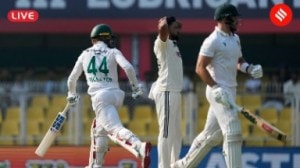Other than lawyer,10 who died or vanished after Major picked them up
Major Avtar Singh was the central character in a series of killings in custody
Major Avtar Singh,who shot himself dead after killing his two children and wife in California on Saturday,was the central character in a series of killings in custody,disappearances and a subsequent cover-up by the Army around Srinagar 16 years ago.
Singh had not only been chargesheeted for the killing in custody of human rights lawyer Jaleel Andrabi but also been found involved in the murder or kidnapping of 10 others,five of whom were part of a group of renegades believed to have been involved in the abduction and murder of Andrabi.
Andrabi
On January 29,1996,two men knocked on Andrabis door and told them their father was in hospital after the Army had set him on fire. They urged him to accompany them,but he asked them to meet him in the High Court. His family had seen three armed men waiting outside.
The visitors returned the next day. This time,Andrabi asked his wife Riffat to talk to them while he photographed them from the attic. The men saw this and raised an uproar before neighbours forced them to leave.
Andrabi had also seen a renegade working with the Army,commander Sikander Ganai,following him even inside the High Court. Worried about his safety,he spent a month in Delhi before returning to Srinagar for Eid.
On March 8,Andrabi was driving home with his wife when he was stopped and taken away by Army personnel. Riffat later approached the police,who didnt register a case but promised to check with the local Rashtriya Rifles unit.
On March 27,brother Arshad Andrabi was called by the police to identify Jaleel Andrabis body,recovered from the Jhelum.
The arrest and disappearance had already led to a public outcry,with a case registered on March 14 under the direction of the Jammu and Kashmir High Court. On March 18,the court had ordered that a Special Investigating Team be set up. The SIT report,when filed,said police had searched for counter-insurgents on the premises of the 35 RR unit HQ in Budgam. One of these was commander Ganai.
The witnesses
On April 5,five bodies were found on the Srinagar-Jammu highway. These men were identified as Ganai,three of his associates and a taxi driver. Quoting Ganais wife Hameeda,the SIT report revealed he had gone to meet Avtar Singh along with another renegade,Ashraf Khan of Larridor,Baramulla.
Khan was arrested that August and gave a statement before a judicial magistrate. In March 1996,Major Avtar Singh along with Sikandar Ganai had brought with them a person wearing a coat and tie. Six persons,Sultan,Balbir Singh,Dr Vaid,Mushtaq and Hyder were present. A heated exchange took place between Avtar Singh and the apprehended person. He was beaten up and confined to a room. After that Avtar Singh came out in the lawn and told me the person is a leading advocate,Jaleel Andrabi,who campaigns against the Army and helps militants. We will eliminate him. That evening,I heard a noise from the room. Thereafter,I saw Army personnel loading a gunny bag into an Army truck and leaving the camp. A few days later,Andrabis body was found.
The SIT report identified an Army major posted in the Rawalpora Camp of the 103 Territorial Army as prima facie responsible for the death. The Army,however,told the court Singh was not in the Army any longer and had not committed the offence in his official capacity.
High Court judge Bilal Nazki,since retired,who had ordered that the SIT be set up and Avtar Singh be arrested,was transferred out of Srinagar. Singhs case symbolises what is wrong with Delhis approach towards Kashmir, he told The Indian Express in an interview. Even after the court had ordered impounding of his passport,Singh was issued travel documents and allowed to escape.
The others
Among the five other murder or kidnapping cases in which the police had found Avtar Singhs involvement,one involved a tailor from a Sikh family in Mehjoor Nagar,who disappeared after Singh picked him up. Another disappearance was that of Imtiyaz Ahmed Wani,a gardener with the forest department,abducted in May 1996.
Abdul Majeed Shah,40,who lived at Ikhrajpora in Srinagar,was among those who died. He had been awakened by a knock and taken away by Army men. A fortnight later,a policeman friend told Shahs father,a retired police officer,about an unidentified body found in south Kashmir. Police had buried it but had taken pictures,from which the senior Shah eventually identified his son.
We approached the Deputy Commissioner and had the body exhumed. The fingernails and toenails had been removed, said Shahs cousin Mushtaq Ahmad.
It was several years later that the family came to know about a police investigation that implicated Avtar Singh in the abduction and murder,says Ahmad.
A fourth victim was Ghulam Qadir Kanni of Batamaloo. Abductors had come knocking on his door,too,just after dinner on February 18,1996,his wife Mehbooba said. Avtar Singh and some ikhwanis (counter-insurgents) barged in and asked him to accompany them, she says. That was the last time the family saw Qadir.
His son Altaf,then 11,who started to search for his father,today hopes to locate his grave instead. I know my father has been killed, he said.
Altaf first filed a complaint with the Batamaloo police but carried out the hunt himself,visiting security camps,interrogation centres and jails. Along the way came threat calls from counter-insurgents,even demands for money,he alleged. First they demanded Rs 50,000. We paid,hoping to see our father, said Altaf. The next demand was for Rs 1 lakh,he said. They told us Major Avtar wanted the money. We paid once again.
A month after the complaint,the police registered an FIR. The investigations made Major Avtar and five counter-insurgents accused in the case, said Kannis other son,Shakeel.
One day,the family got an Army letter asking them to identify the major who had picked up Kanni. At Badami Bagh (cantonment) Army officers were lined up, Altaf said. Major Avtar was sitting among them. I identified him. He claimed the Army promised action.
The family eventually approached the State Human Rights Commission,which concluded: The commission can presume under the Provision of Evidence Act that the kidnapped person is no more.
For Kannis daughter Subeena,Singhs suicide is not the end. He was not alone in committing this murder, she said.



- 01
- 02
- 03
- 04
- 05




























